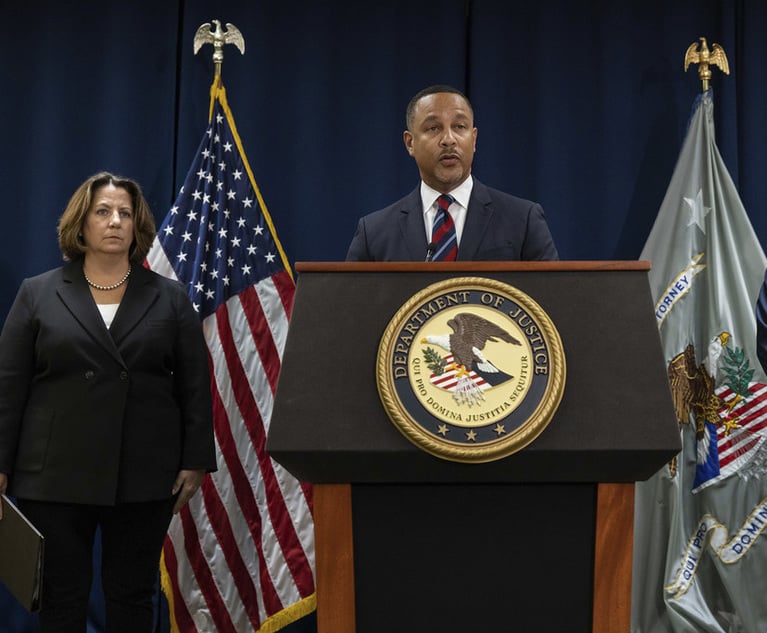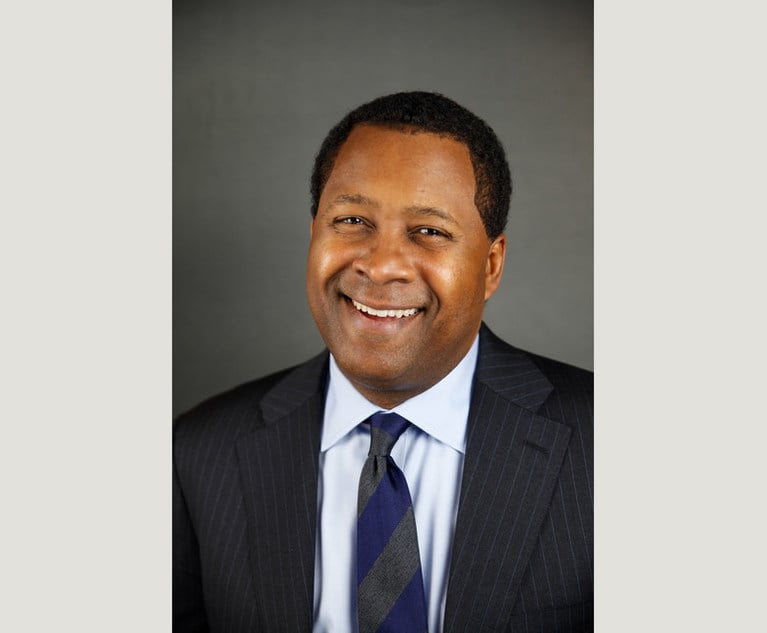Compliance Hot Spots: Volcker Moratorium Extended | Foreign Bribery in Focus | New FARA Filings | Who Got the Work
Volcker Rule enforcement for foreign funds is delayed, and a new bipartisan US House bill would let US prosecutors go after corporate bribe recipients abroad. Scroll down for Who Got the Work and our latest roundup of new moves. Thanks for reading — and your feedback is appreciated.
August 06, 2019 at 09:00 PM
9 minute read
Welcome to Compliance Hot Spots, our weekly summary of news and analysis on regulatory, compliance and enforcement trends. This week we’re highlighting:
–Volcker Rule enforcement for foreign funds is delayed –US House bill would boost FCPA prosecutors –New FARA registrations from Skadden and White & Case
Tips, feedback and general thoughts on your practices are always appreciated. I’m C. Ryan Barber—reach me at [email protected] and 202-828-0315, or follow me on Twitter @cryanbarber. Thanks for reading!

Volcker Rule Enforcement for Foreign Funds Delayed
In a decision important to foreign banks, private equity firms and hedge funds, five federal financial regulatory agencies responsible for carrying out the Volcker Rule under Dodd-Frank banking reform legislation jointly announced recently that they will extend a moratorium on enforcing restrictions on trading and investment by certain foreign hedge funds and private equity funds for another two years, until July 21, 2021.
The rules originally were supposed to take effect July 21, 2015, but there have been a few extensions already. Schulte Roth & Zabel partner Joseph Vitale in New York and Washington, co-head of its bank regulatory group and author of a client alert on the matter said, “it is important first and foremost for foreign banks that are indirectly benefiting from the moratorium and they can continue until this extension expires.”
Vitale said the “rule would have shut down a lot of hedge funds and the rule wasn’t designed to pick them up but to make sure that banks don’t engage in these activities.” But he said U.S. banks also are paying attention “because they weren’t crazy about all the exceptions that were available for foreign banks, and the Volcker Rule creates an uneven playing field for U.S. banking institutions. Domestic banks are watching that as well to see if the pendulum swings so far that it really is a disadvantage to them.”
In July 2018, the financial regulatory agencies published a notice of proposed revisions to the Volcker Rule. —MP McQueen

House Bill Would Let US Prosecutors Go After Corporate Bribe Recipients Abroad
A bipartisan group introduced a bill in the U.S. House of Representatives that would allow U.S. prosecutors to indict foreign officials who demand or accept bribes in return for fulfilling, ignoring or violating their official duties, my colleague Sue Reisinger reports at Law.com.
>> William Steinman said the proposed law does not impose any significant new burden or corporations. Steinman is a name partner at Steinman & Rodgers, a boutique Washington, D.C., law firm that focuses on foreign bribery cases. “The bill does not require a company to report a bribe solicitation,” he said. “But could they face more burdens as witnesses in such cases? Sure, it’s possible.”
>> Kristen Savelle, managing director of the Rock Center for Corporate Governance at Stanford University, saw some possible rough spots in the bill. Savelle also oversees Stanford Law School’s Foreign Corrupt Practices Act Clearinghouse. She found the bill to be vague about its jurisdictional parameters, “and there are certainly concerns that the U.S. is interfering with local prosecutions by the jurisdictions where the foreign officials reside.”

Who Got the Work
>> A team from White & Case, including Carolyn Lamm (above), Nicole Erb and Scott Hershman has registered to advocate for the Russian-owned government bank Vnesheconombank, according to a new disclosure to the U.S. Justice Department. “White & Case may conduct meetings with US government sanctions authorities on behalf of VEB.RF regarding potential new sanctions legislation that could affect the activities of VEB.RF,” the disclosure said. Erb co-leads the firm’s international sanctions practice, and Hershman is chairman of the firm’s global white-collar practice team.
>> Skadden, Arps, Slate, Meagher & Flom has registered to advocate for Kuwait-based Agility Public Warehousing Company K.S.C.P., according to new filings at the Justice Department’s Foreign Agents Registration Act unit. Margaret Krawiec, a Skadden litigation partner in Washington, is lead on the engagement to provide “advice on public relations related to legal representation on evolving legal matters.” Agility provides “integrated logistics services, including air, ocean, and ground freight forwarding, warehousing and distribution services, and industrial real estate management,” Skadden said in its FARA filing.
>> “Two former top staffers to Senate Majority Leader Mitch McConnell have lobbied Congress and the Treasury Department on the development of a new Kentucky aluminum mill backed by the Russian aluminum giant Rusal, according to a new lobbying disclosure,” Politico reports. Hunter Bates, a former chief of staff, and Brendan Dunn, a tax advisor to McConnell, work at Akin Gump Strauss Hauer & Feld.
>> Ashley Parrish, a King & Spalding partner, is counsel to Amarin Pharma Inc. on a new U.S. Supreme Court petition. “This case offers the Court an opportunity to restore the private rights of action that Congress granted parties under the Tariff Act of 1930 in order to protect domestic industry from unfair trade practices. In its decision below, the Federal Circuit extinguished those rights for large segments of the market.”

Compliance Reading Corner
How Trump’s Political Appointees Overruled Tougher Settlements With Big Banks. “In settlements last year with the two big U.K.-based banks, Barclays and Royal Bank of Scotland, political appointees at the Trump administration Justice Department took the unusual step of overruling staff prosecutors to reduce the settlements sought, leaving billions of dollars in potential recoveries on the table, according to four people familiar with the settlements.” [Pro Publica and American Banker]
Court Bolsters US Power to Grab Chinese Bank Records. “A US appeals court has bolstered the power of federal prosecutors to grab records from foreign banks even if the transactions at issue did not pass through US accounts. In a ruling released on Tuesday, three appeals court judges in Washington sided with the Department of Justice against a trio of Chinese banks, including one that had received a subpoena under the Patriot Act.” [Financial Times]
Justice Department, FTC Skirmish Over Antitrust Turf. “The two agencies, which have divvied antitrust enforcement for more than a century, have been known to skirmish over their shared responsibilities in the past. But some observers say it has reached new heights just as scrutiny of companies such as Alphabet Inc.’s Google unit, Amazon.com Inc., Facebook Inc. and Apple Inc. has become a priority in Washington. The tensions are raising alarm, from the antitrust legal community to Congress, that the continuing feud could disrupt the coming probes into large technology companies, sometimes called Big Tech, or could place an unfair burden on the companies under review.” [WSJ]
 Judge Sets ‘Very Low Bar’ for Government’s Dismissal of Gilead Qui Tam Case. A federal judge overseeing a whistleblower lawsuit against Gilead Sciences Inc. seemed on the verge of granting a request from government lawyers to dismiss the long-running case Thursday afternoon, but stopped just short. U.S. District Judge Edward Chen (at left) of the Northern District of California said the level of scrutiny he would give to the government’s decision to ask to dismiss the case was “very low.” But Chen said he wants to give the government lawyers an opportunity to provide further detail about their basis for asking to dismiss the case. [Law.com]
Judge Sets ‘Very Low Bar’ for Government’s Dismissal of Gilead Qui Tam Case. A federal judge overseeing a whistleblower lawsuit against Gilead Sciences Inc. seemed on the verge of granting a request from government lawyers to dismiss the long-running case Thursday afternoon, but stopped just short. U.S. District Judge Edward Chen (at left) of the Northern District of California said the level of scrutiny he would give to the government’s decision to ask to dismiss the case was “very low.” But Chen said he wants to give the government lawyers an opportunity to provide further detail about their basis for asking to dismiss the case. [Law.com]
Crypto Tax Avoiders Face IRS Roulette: Fess Up or Try to Hide. Cryptocurrency tax compliance is now a priority. IRS criminal chief Don Fort has described digital and virtual currencies as a “significant threat” to tax collection and said the agency will soon announce criminal tax evasion cases involving them.” [Bloomberg]
CFIUS Rules Are Coming, and They’re Not What You Think. “There’s been a lot of surprises in recent years in the kinds of deals they consider national security, and probably more surprises in store,” said Arent Fox national security partner David Hanke in Washington He said the law’s reach extends to companies in the health care sector, agriculture and transportation among others—”where people might not typically think of national security.” [Law.com]

Notable Moves & More
• Wilson Sonsini Goodrich & Rosati has hired Tarek Helou as a partner in Washington. Helou joins from the U.S. Justice Department, where he had been an assistant chief in the Foreign Corrupt Practices Act unit.
 • American Airlines Group Inc. has found its next top lawyer: Priya Aiyar, an Ivy League-educated Big Law partner and former acting general counsel of the Treasury Department. Aiyar (at left) joins AA’s Fort Worth, Texas-based legal department by way of Willkie Farr & Gallagher, where she serves as a partner in the firm’s litigation and global trade and investment groups in Washington, my colleague Phillip Bantz reports at Law.com. “I was very happy in private practice,” Aiyar (at left) said. “But when this opportunity came along I just thought that it’s not very often you get the chance to work for a great and iconic American company with the breadth of legal issues an airline faces.”
• American Airlines Group Inc. has found its next top lawyer: Priya Aiyar, an Ivy League-educated Big Law partner and former acting general counsel of the Treasury Department. Aiyar (at left) joins AA’s Fort Worth, Texas-based legal department by way of Willkie Farr & Gallagher, where she serves as a partner in the firm’s litigation and global trade and investment groups in Washington, my colleague Phillip Bantz reports at Law.com. “I was very happy in private practice,” Aiyar (at left) said. “But when this opportunity came along I just thought that it’s not very often you get the chance to work for a great and iconic American company with the breadth of legal issues an airline faces.”
• Clifford Chance investigations director Zoe Osborne has left the Magic Circle firm to join U.S. outfit Steptoe & Johnson LLP. Steptoe & Johnson’s London base, which opened in 2001, has had a historical focus on investigatory work that often involves the U.K.’s Serious Fraud Office, my colleague Rose Walker reports.
• Shauna Itri, a litigator who focuses on complex fraud cases, has left Berger Montague to join Seeger Weiss. “Itri also has extensive experience representing whistleblowers in False Claims Act litigation, and whistleblowers with claims under the IRS and SEC whistleblower programs—returning over $3 billion to state and federal governments,” Seeger Weiss said.
This content has been archived. It is available through our partners, LexisNexis® and Bloomberg Law.
To view this content, please continue to their sites.
Not a Lexis Subscriber?
Subscribe Now
Not a Bloomberg Law Subscriber?
Subscribe Now
NOT FOR REPRINT
© 2025 ALM Global, LLC, All Rights Reserved. Request academic re-use from www.copyright.com. All other uses, submit a request to [email protected]. For more information visit Asset & Logo Licensing.
You Might Like
View All
Compliance Hot Spots: GOP Eyes ESG as an Antitrust Issue + Another DOJ Crypto Seizure + Sidley Partner Jumps to Main Justice
9 minute read
Compliance Hot Spots: Lessons from Lafarge + Fraud Section Chief Talks Compliance + Cravath Lands FTC Commissioner
11 minute readTrending Stories
- 16-48. It’s Comp Time Again: How To Crush Your Comp Memo
- 2'Religious Discrimination'?: 4th Circuit Revives Challenge to Employer Vaccine Mandate
- 3Fight Over Amicus-Funding Disclosure Surfaces in Google Play Appeal
- 4The Power of Student Prior Knowledge in Legal Education
- 5Chicago Cubs' IP Claim to Continue Against Wrigley View Rooftop, Judge Rules
Who Got The Work
Michael G. Bongiorno, Andrew Scott Dulberg and Elizabeth E. Driscoll from Wilmer Cutler Pickering Hale and Dorr have stepped in to represent Symbotic Inc., an A.I.-enabled technology platform that focuses on increasing supply chain efficiency, and other defendants in a pending shareholder derivative lawsuit. The case, filed Oct. 2 in Massachusetts District Court by the Brown Law Firm on behalf of Stephen Austen, accuses certain officers and directors of misleading investors in regard to Symbotic's potential for margin growth by failing to disclose that the company was not equipped to timely deploy its systems or manage expenses through project delays. The case, assigned to U.S. District Judge Nathaniel M. Gorton, is 1:24-cv-12522, Austen v. Cohen et al.
Who Got The Work
Edmund Polubinski and Marie Killmond of Davis Polk & Wardwell have entered appearances for data platform software development company MongoDB and other defendants in a pending shareholder derivative lawsuit. The action, filed Oct. 7 in New York Southern District Court by the Brown Law Firm, accuses the company's directors and/or officers of falsely expressing confidence in the company’s restructuring of its sales incentive plan and downplaying the severity of decreases in its upfront commitments. The case is 1:24-cv-07594, Roy v. Ittycheria et al.
Who Got The Work
Amy O. Bruchs and Kurt F. Ellison of Michael Best & Friedrich have entered appearances for Epic Systems Corp. in a pending employment discrimination lawsuit. The suit was filed Sept. 7 in Wisconsin Western District Court by Levine Eisberner LLC and Siri & Glimstad on behalf of a project manager who claims that he was wrongfully terminated after applying for a religious exemption to the defendant's COVID-19 vaccine mandate. The case, assigned to U.S. Magistrate Judge Anita Marie Boor, is 3:24-cv-00630, Secker, Nathan v. Epic Systems Corporation.
Who Got The Work
David X. Sullivan, Thomas J. Finn and Gregory A. Hall from McCarter & English have entered appearances for Sunrun Installation Services in a pending civil rights lawsuit. The complaint was filed Sept. 4 in Connecticut District Court by attorney Robert M. Berke on behalf of former employee George Edward Steins, who was arrested and charged with employing an unregistered home improvement salesperson. The complaint alleges that had Sunrun informed the Connecticut Department of Consumer Protection that the plaintiff's employment had ended in 2017 and that he no longer held Sunrun's home improvement contractor license, he would not have been hit with charges, which were dismissed in May 2024. The case, assigned to U.S. District Judge Jeffrey A. Meyer, is 3:24-cv-01423, Steins v. Sunrun, Inc. et al.
Who Got The Work
Greenberg Traurig shareholder Joshua L. Raskin has entered an appearance for boohoo.com UK Ltd. in a pending patent infringement lawsuit. The suit, filed Sept. 3 in Texas Eastern District Court by Rozier Hardt McDonough on behalf of Alto Dynamics, asserts five patents related to an online shopping platform. The case, assigned to U.S. District Judge Rodney Gilstrap, is 2:24-cv-00719, Alto Dynamics, LLC v. boohoo.com UK Limited.
Featured Firms
Law Offices of Gary Martin Hays & Associates, P.C.
(470) 294-1674
Law Offices of Mark E. Salomone
(857) 444-6468
Smith & Hassler
(713) 739-1250










